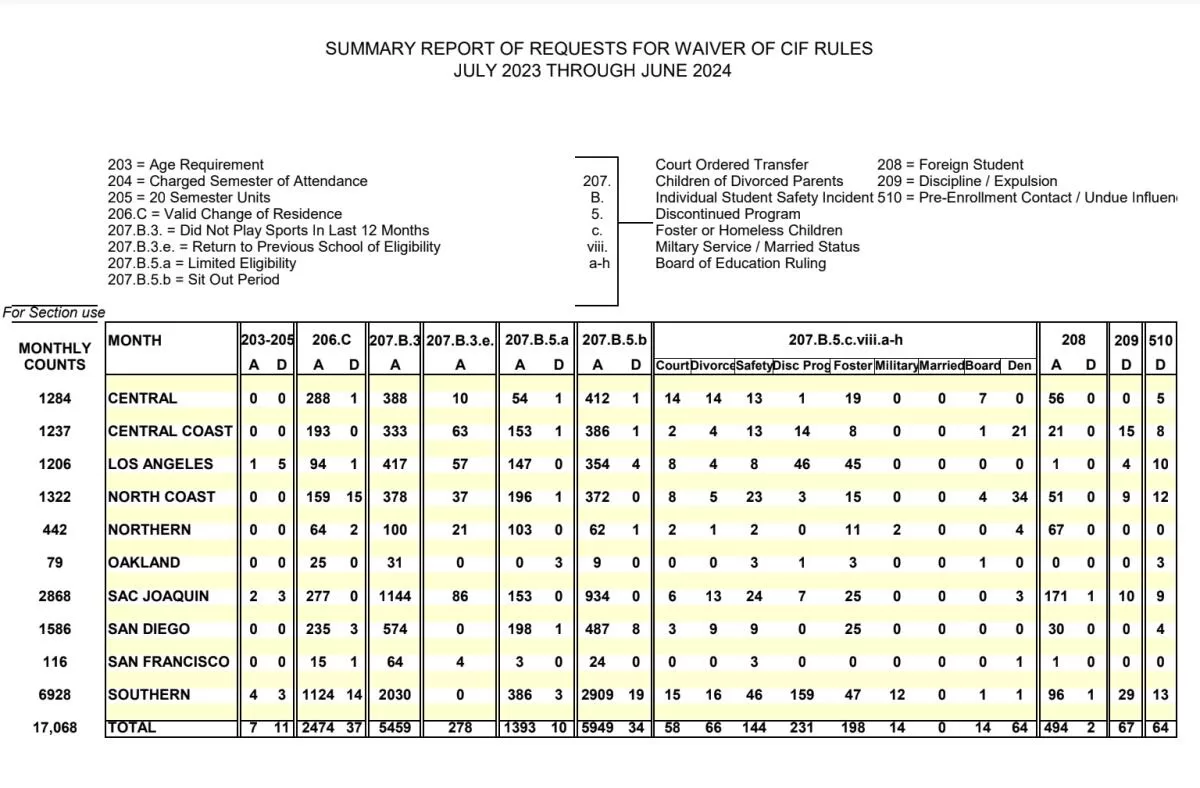High school sports transfers reached a record level in California for the 2023-24 school year, with 17,068 students switching schools, according to final statistics obtained from the California Interscholastic Federation, the state’s governing body.
The number exceeds the previous record of 16,839 established in the 2017-18 school year. Leading the way among the 10 sections was the Southern Section, which had 6,928 transfers, a rise of 545 over last year (8.56%).
There is clear evidence that parents are transferring their sons and daughters for sports reasons. That was shown during the 2020-21 school year, when the pandemic disrupted sports seasons and resulted in only 7,210 statewide transfers. The next school year, transfers doubled to 14,818 and have been rising annually since then.
Transfer numbers for high school sports in California for 2023-24.
(CIF)
Students who transfer without changing residences are ineligible for one month of the season, while those who do change residences are immediately eligible.
The question is whether a growing number of transfers should be a concern for CIF officials and what options are available to help people understand that rules need to be followed.
Ron Nocetti, executive director of the CIF, said, “98 percent of our students don’t transfer. We’re aware it’s the high-profile transfers that our membership wants to take a look at, and that’s what we’ll be discussing this fall.”
Nocetti has created committees that will look into CIF priorities for the coming years. On another note, Nocetti said participation numbers went from 763,000 to 806,000.
The transfer numbers come after a rare high school basketball season in which Harvard-Westlake won a state Open Division title and King/Drew won the City Section Open Division title with no transfers.
Terry Barnum, the head of athletics at Harvard-Westlake who will be joining the Southern Section Executive Committee this year, said, “Just because there’s a record number of transfers doesn’t necessarily mean rules are being broken. I don’t think kids are moving because some coach is lurking in the the bushes, ‘Come here.’ What I think happens more often is families are looking at the situation of a given school, ‘You know what, I don’t like the situation. I can play quicker here.’ I think the majority of these transfers are initiated by parents and families more than coaches.”
In the Southern Section, the largest section with more than 560 schools, when transfer information is submitted, it comes from the school. The Southern Section reviews the paperwork online. It rarely sends out anyone to review information at the school.
In contrast, the City Section, with 159 schools, sends out the commissioner to schools that receive multiple transfers from a specific sport, calls in parents, coaches and administrators, and goes over paperwork and any concerns, not relying on schools to simply clear the athletes.
The CIF has been promoting education-based high school sports, but transfers exceeding 17,000 for the first time statewide is something section commissioners and member schools can’t ignore in a changing environment that has private schools competing against public schools for athletes and sports trophies.
